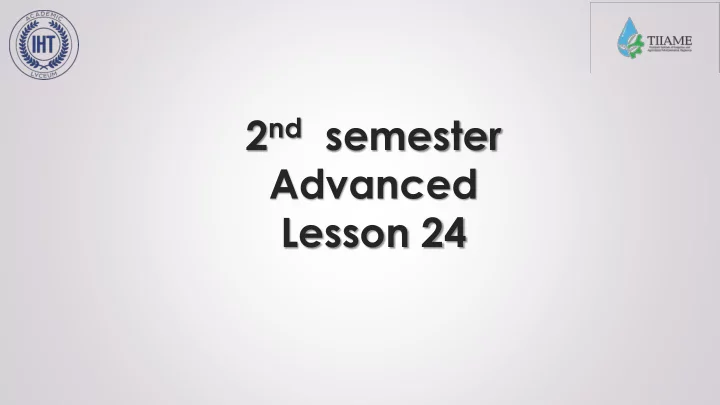

2 nd semester Advanced Lesson 24
Topic 24: Review. Use of English Intermediate control work № 2
Join the following sentences using defining and non ‐ defining relative clauses. Don’t forget to use commas in non ‐ defining clauses. 1. Last night we watched a film. It was very funny. ____________________________________________________________________ 2. Christopher Columbus was a famous sailor. He discovered America. ___________________________________________________________________ 3. My parents live in England. They are scientists. ____________________________________________________________________ 4. We’ve bought a new bike. Its handlebars are broken. ____________________________________________________________________ 5. That’s the theatre. We met Liza Mineli there. ____________________________________________________________________
Complete the sentences using relative pronouns or adverbs. Write brackets ( ) if they can be omitted. 1. Michael, ___________ will be 20 years old next week, is very good at handball. 2. My uncle’s house, ___________ was restored five years ago, is for sale now. 3. The programme ___________ we watched on TV last night was very interesting. 4. The man ___________ children go to the same school as George has a BMW. 5. The village ___________ I was born is full of tourists in summer. 6. The bike ___________ I’ve just bought was made in Italy. 7. That was the month ___________ Carol started working. 8. That’s the reason why ___________ we stayed at home.
Article The U.S. dollar has been powering higher since Donald Trump won the presidential election and the euro has been weakening, putting the two currencies on a collision course. The dollar's 9% move since Election Day means it's now worth € 0.96. That's its highest level since 2003. The trend has led to predictions of parity -- that is, when $1 is worth € 1. The last time that happened was 2002. Adam Slater, the head economist at Oxford Economics, said Thursday that parity could be reached by the end of 2017. Other economists think the key psychological level will be reached even sooner. Slater said the currency moves are now being driven by divergent monetary policies on either side of the Atlantic Ocean.
The U.S. Federal Reserve is raising interest rates as it sees the American economy improve and expects rising prices. Meanwhile, the European Central Bank has extended its stimulus program and kept interest rates at record lows to support the economy and boost inflation. Investors are attracted to higher interest rates and stronger economies because they expect a better return on their money, which has pushed up the dollar. Europe is essentially the flip side of the coin. President-elect Trump is also playing heavily into the currency equation because he's promised to slash taxes and regulations and support infrastructure projects. His policies could create an inflationary environment where the Federal Reserve will have to keep hiking interest rates to keep inflation at bay.
True or False 1. $1 is equal to € 1? T/F 2. $1 has never been equal to € 1? T/F 3. Adam Slater, the head economist at Oxford Economics, said Thursday that parity could be reached by the end of 2017? T/F 4. President-elect Trump has promised to slash taxes? T/F
Recommend
More recommend